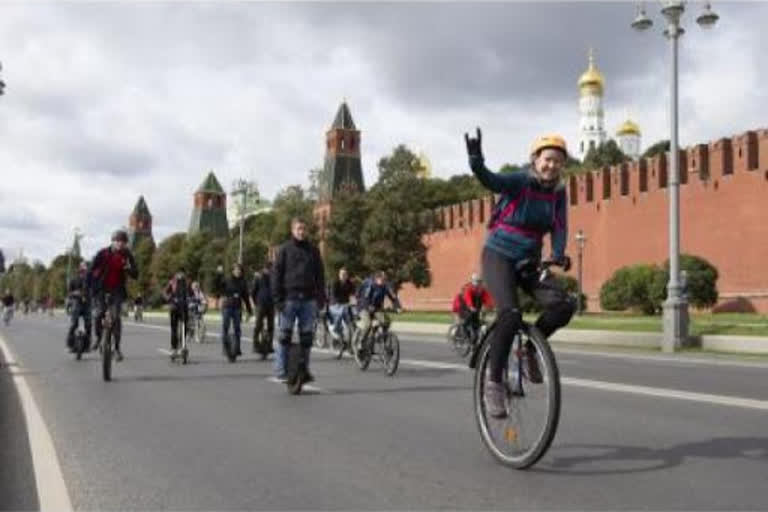Hyderabad: The world Bicycle Day is being celebrated on June 3rd. The United Nations celebrated the first World Bicycle Day on Sunday, June 3, 2018, at UN General Assembly in New York.
The World Health Organization has recommended cycling both as a mode of transport and as a way of staying healthy during the global crisis.
With World Bicycle Day set for June 3rd, now is a good time to take stock of the benefits of the bicycle both for staying healthy and as a sustainable mode of transport during (and after) the global crisis.
Background
• Acknowledging the uniqueness, longevity and versatility of the bicycle, which has been in use for two centuries, and that it is a simple, affordable, reliable, clean and environmentally fit sustainable means of transportation, fostering environmental stewardship and health, the General Assembly decided to declare 3 June World Bicycle Day.
• It encouraged stakeholders to emphasize and advance the use of the bicycle as a means of fostering sustainable development, strengthening education, including physical education, for children and young people, promoting health, preventing disease, promoting tolerance, mutual understanding and respect and facilitating social inclusion and a culture of peace.
• The Assembly welcomed initiatives to organize bicycle rides at the national and local levels as a means of strengthening physical and mental health and well-being and developing a culture of cycling in society.
Why Bicycle day celebrated?
Regular physical activity of moderate intensity – such as walking, cycling, or doing sports – has significant benefits for health. At all ages, the benefits of being physically active outweigh potential harm, for example through accidents.
According to the World Health Organization (WHO), safe infrastructure for walking and cycling is also a pathway for achieving greater health equity. For the poorest urban sector, who often cannot afford private vehicles, walking and cycling can provide a form of transport while reducing the risk of heart disease, stroke, certain cancers, diabetes, and even death. Accordingly, improved active transport is not only healthy; it is also equitable and cost-effective.
• The bicycle is a simple, affordable, reliable, clean and environmentally fit sustainable means of transportation;
• The bicycle can serve as a tool for development and as a means not just of transportation but also of access to education, health care and sport;
• The synergy between the bicycle and the user fosters creativity and social engagement and gives the user an immediate awareness of the local environment;
• The bicycle is a symbol of sustainable transportation and conveys a positive message to foster sustainable consumption and production, and has a positive impact on climate.
Importance and Effects of World Bicycle Day
• Encourages the Member States to devote particular attention to policies and programmers to include the bicycle in national and sub-national development.
• Encourages the Member States to improve road safety and integrate it into sustainable cycling mobility to protect pedestrian safety.
• Encourages stakeholders to emphasize the use of the bicycle as a means of strengthening education, including physical education, preventing disease, promoting tolerance, mutual understanding and facilitating social inclusion.
• Encourages the Member States to adopt best practices and means to develop and promote the culture of cycling in society.
Physical Benefits
• Cycling Lower risk of heart disease
• Reduced risk of Type 2 diabetes
• Extra weight loss
• Safe for sexual health
Last year celebration in India
Over 10,000 cyclists came out to the streets of New Delhi on Sunday morning to celebrate World Bicycling Day.
In Bangalore, the recently elected Bicycle Mayor for the city, Sathya Sankaran, led a 10 km ride with a hundred cyclists, while celebrations took place in different parts of the city.
Also Read: Bihar girl cycling 1,300 km with father impresses Ivanka Trump
Lockdown Situation
In this lockdown situation, many migrant workers returned to their native places by cycle.
• Mahesh Jena, a 20-year-old migrant worker cycled a distance over 1,700 km from Maharashtra to reach his home in Odisha in just seven days after lockdown.
• Jyoti Kumari, a 15-year-old girl cycled 1200 km from Gurugram to Bihar over eight days with her ailing father in tow, a journey that has drawn international praise. She has been offered a trial by the Cycling Federation of India. The courageous story of Jyoti has also reached the White House in the USA as President Donald Trump’s daughter Ivanka Trump tweeted lauding the Indian girl.
• Sagheer Ansari, 26, a migrant worker, trying to cycle over 1,000 kilometres from Delhi to his hometown East Champaran in Bihar on May 5. He died in Lucknow after being hit by a car.
• Mafippul, 20, a migrant worker travelled to Kolkata on a borrowed bicycle from Cherppu.
Also Read: Jyoti Kumari, who cycled 1300km in 7 days due to lockdown, to be called for trial by CFI



